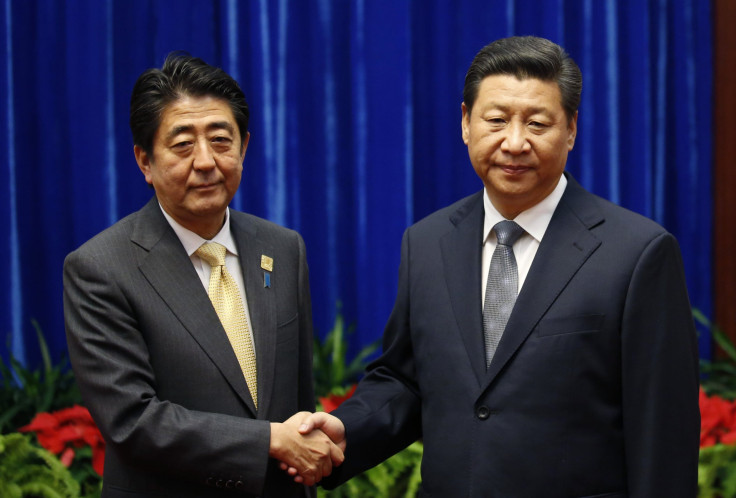China, Japan Leaders Hold Meeting Before APEC Summit In Beijing, Amid Tensions

Chinese President Xi Jinping and Japanese Prime Minister Shinzo Abe met on Monday after two years of constant tensions between the two Asian giants over a range of issues, both current and historic. The meeting took place in Beijing’s Great Hall of the People, and follows an agreement last week between the two sides to stabilize and promote bilateral trade.
The meeting took place before the start of the Asia-Pacific Economic Cooperation, or APEC, forum, which begins in Beijing on Tuesday. Over the years, the two countries have clashed over a series of issues, not least among them being the issue of sovereignty over a set of islands in the East China Sea, known as Diaoyu in China and as Senkaku in Japan. China and Japan have also been involved in frequent diplomatic clashes over the latter's actions as an occupying power.
However, on Friday, the two countries issued a joint statement that they will try to resume talks on political, diplomatic and security concerns going forward, The Associated Press, or AP, reported.
China has repeatedly asked Japan to accept that the island’s sovereignty is in dispute but Tokyo has refused to do so and, in 2012, took the step to nationalize the islands. Meanwhile, Chinese patrol ships have penetrated the surrounding waters to challenge Japanese coast guard vessels, raising security fears, AP reported. In June, Japan accused China of letting its fighter jets fly too close to its military aircraft over the East China Sea. In August, Japanese fighter jets reportedly shadowed Chinese planes, which were patrolling disputed waters.
In 2013, Abe visited a Tokyo Shinto shrine, which honors soldiers who died during World War II, including some convicted of war crimes. The move infuriated Beijing, which accused Japan of being insensitive to China’s suffering during the war. China has asked for assurances from Japan that Abe will not visit the shrine again. But, this might be a hard demand for Japan to accept and, last Friday, Abe said that the agreement did not cover specific issues, including visits to the shrine, Reuters reported.
Meanwhile, China and South Korea are expected to finalize a free-trade deal aimed at reducing barriers to trade and investment between the two countries. The deal, which covers 17 areas and will be signed by Xi and South Korean President Park Geun-hye later Monday, follows two years of negotiations.
"South Korean and Chinese leaders today declared an effective conclusion of the FTA at a summit meeting held at the Great Hall of the People in Beijing," Min Kyung-wook, a spokesperson for the Korean presidential office, said in a statement, according to Reuters. South Korea already has a free-trade agreement with the U.S. and the European Union.
© Copyright IBTimes 2024. All rights reserved.





















